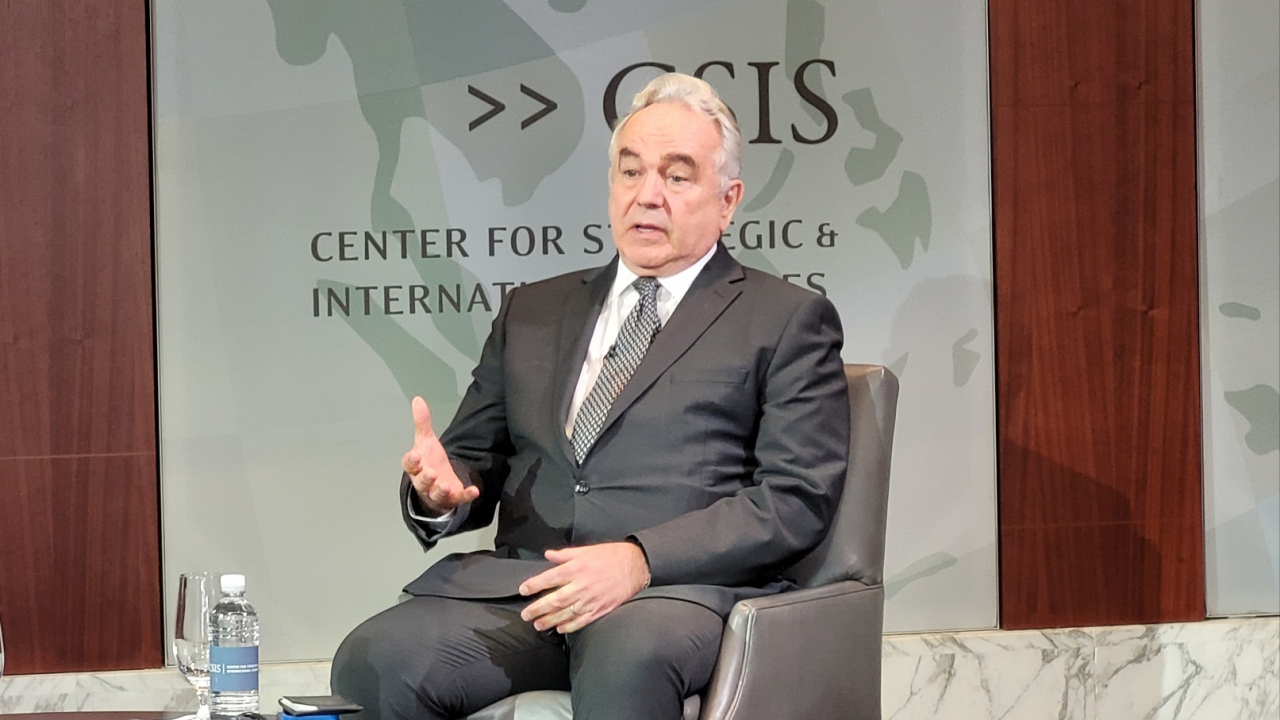 |
US Deputy Secretary of State Kurt Campbell speaks during a forum co-hosted by the Center for Strategic and International Studies (CSIS) and the Korea Foundation in Washington on Monday. |
S. Korean FM reaffirms commitment to ‘peace through strength’
US Deputy Secretary of State Kurt Campbell speaks during a forum co-hosted by the Center for Strategic and International Studies (CSIS) and the Korea Foundation in Washington on Monday.
Kurt Campbell, the US deputy secretary of state and a key architect of America’s Indo-Pacific strategy, made a direct appeal to the incoming Trump administration: be a "constant," not a "variable," in its military presence and commitment to South Korea and other key allies in the region.
Campbell warned that scaling back US troop levels, especially in South Korea and Japan, or renegotiating the defense cost-sharing agreements with the treaty allies secured under the Biden administration would jeopardize US strategic interests in the Indo-Pacific, where China continues to expand its military and economic influence.
"This is a period when Asian interlocutors -- our partners and friends -- are looking for elements of commitment and stability. They want to see the United States as a constant, not a variable. Now, obviously, transitions are challenging periods," Campbell said in his keynote remarks Monday during the 9th annual Korea-US Strategic Forum in Washington co-hosted by CSIS and the Korea Foundation.
"I think any effort that would look to substantially remove US forces or change the nature of our fundamental commitments to the Indo-Pacific, if that happened at this juncture, would be contrary to American strategic interests."
Campbell stated that a pivotal aspect of recent US military diplomacy is the strategic redistribution of US military capabilities and resources, historically concentrated in Northeast Asia such as South Korea and Japan, to bolster engagements in Southeast Asia and Australia.
"I think that effort is extraordinarily important. But at the core of our military engagement are our rock-solid alliances with both Japan and South Korea," Campbell said, alluding to the importance of the shift amid the growing rivalry with China -- though he did not explicitly mention Beijing.
"After decades of having to make the domestic arguments about why forward-deployed American engagement is essential to the maintenance of peace and stability, that battle has largely been won in both Japan and the ROK," he added, referring to South Korea by its official name, the Republic of Korea.
Campbell also defended the newly inked Special Measures Agreement with South Korea, a defense-cost sharing deal for 2026 to 2030, which was officially signed in early November.
“We've recently concluded extraordinarily generous and gracious host nation support arrangements with both Japan and South Korea, the ROK, signaling the determination to keep the United States forward, engaged and deployed," Campbell said. "My hope is that the wisdom of these efforts will be fully appreciated in a new administration.”
The most recent Host Nation Support agreement between Japan and the US, signed in January 2022, is in effect until 2027.
When asked about the future of the Nuclear Consultative Group between Seoul and Washington under Trump, Campbell emphasized that the US must uphold a strong and sustained commitment to extended deterrence for South Korea against North Korea.
Campbell highlighted that deterrence efforts must not be seen as a one-time or isolated measure, stressing the importance of continuous deployments of US strategic assets, ongoing consultations at all levels, and the continuation of vital military exercises with South Korea.
At the same event, South Korean Foreign Minister Cho Tae-yul said, “The Yoon Suk Yeol administration's determination to assume roles and responsibilities commensurate with Korea's strength comports very well with the expectation that allies must pull their weight.”
“Seoul, too, is committed to maintaining peace through strength and making sure that its defense spending is robust,” Cho said in his congratulatory remarks, presented on video.
Cho noted that only three US allies and partners -- Israel, Greece and Poland -- allocate a higher percentage of their gross domestic product to defense than South Korea.
Reflecting on the past, Cho pointed out that during the first Trump administration, Seoul lacked both an Indo-Pacific strategy and a strong relationship with Japan. However, Cho stressed that South Korea’s current Indo-Pacific strategy and its strengthened trilateral cooperation with the US and Japan are well-positioned to align with the priorities of the second Trump administration.
Cho further emphasized the critical link between North Korea’s denuclearization and curbing Russia’s aggression, noting that Moscow’s actions have been bolstered by Pyongyang’s supply of weapons and deployment of troops.
“Its troops and weapons deployed to Russia are directly threatening Europe and reshaping security dynamics in the Indo-Pacific and Europe," Cho said.
"Thus, any attempt to end the war in Ukraine would be inadequate without addressing North Korea's illicit assistance to Russia's war efforts, and any attempt to stop North Korea's military support for Russia's aggression would be incomplete without a parallel push to denuclearize North Korea."



![[Weekender] Korea's traditional sauce culture gains global recognition](http://res.heraldm.com/phpwas/restmb_idxmake.php?idx=644&simg=/content/image/2024/11/21/20241121050153_0.jpg)



